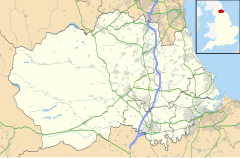Peterlee
| Peterlee | |
|---|---|
|
The Apollo Pavilion |
|
| Peterlee shown within County Durham | |
| Population | 20,164 (2011) |
| OS grid reference | NZ430409 |
| Unitary authority | |
| Ceremonial county | |
| Region | |
| Country | England |
| Sovereign state | United Kingdom |
| Post town | PETERLEE |
| Postcode district | SR8 |
| Dialling code | 0191 |
| Police | Durham |
| Fire | County Durham and Darlington |
| Ambulance | North East |
| EU Parliament | North East England |
| UK Parliament | |
Peterlee is a small town built under the New Towns Act of 1946, in County Durham, England. Founded in 1948, Peterlee town originally mostly housed coal miners and their families.
Peterlee has economic and community ties with Sunderland, Hartlepool and Durham.
The case for Peterlee was put forth in Farewell Squalor by Easington Rural District Council Surveyor C.W. Clarke, who also proposed that the town was named after the celebrated Durham miners' leader Peter Lee. Peterlee is unique among the new towns which came into being after the Second World War in that it was the only one requested by the people through their MP. A deputation, mostly if not all working miners, met with the Minister of Town and Country Planning after the Second World War to put the case for a new town in the district. The minister Lewis Silkin responded by offering a half-size new town of 30,000 residents. Subsequently, they came largely from the surrounding villages in the District of Easington.
The Peterlee Development Corporation was established in 1948, first under the direction of A V Williams, then under Dr. Monica Felton. The original master-plan for towering blocks of flats by Berthold Lubetkin was rejected as unsuitable for the geology of the area, which had been weakened by mining works, and he resigned in 1950. George Grenfell Baines replaced Lubetkin and began to build quickly, resulting in buildings of poor-quality construction. Williams invited an artist Victor Pasmore to be head of the design team for the landscaping.
The Apollo Pavilion,designed by Victor Pasmore, was completed in 1970. It provided a focal point for the Sunny Blunts estate as well as a bridge across a water-course. It was named after the Apollo moon missions.
...
Wikipedia

